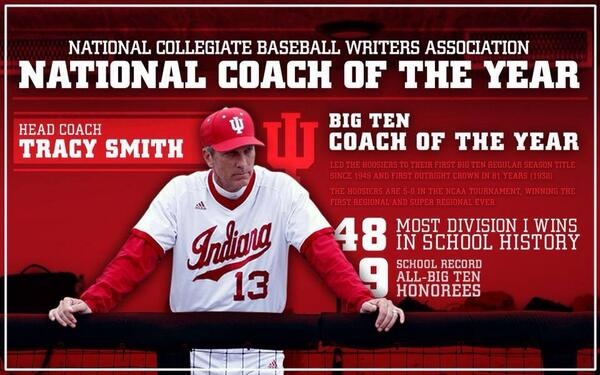If you are following the College World Series right now, you’re familiar with the Indiana University baseball program and their head coach, Tracy Smith, or “Skip” as he’s known to his players.
Coach Smith has led the IU Hoosier baseball program to their first NCAA Super Regional and now, first College World Series in school history.
If that wasn’t enough, he was recently named National Coach of the Year by the NCBWA.
This is the second time that Coach Smith has completely turned a baseball program around and brought a team to new heights.
I was privileged enough to be at the back end of his first turn around at Miami University.
My senior year (Skip’s last year at Miami before taking over at Indiana), we tied a school record for wins with a 45-18 record that included a MAC Championship and a berth in the NCAA Regional that year in Texas.
In my four years of playing under Coach Smith, there were many ups and downs.
You didn’t like him every day, but you couldn’t help but respect him. As he liked to point out at the beginning of every school year, “I’m not here to be your best friend, I’m here to make you better.”
He demanded a lot out of each individual player and always pushed us physically and mentally.
It wasn’t until after my playing career ended that I started fully appreciating the baseball and life lessons I learned during my four years under “Skip”.
Post-college, we continue to keep in touch, and he has been beyond helpful to me in starting and maintaining Next Level Ballplayer.
In honor of Tracy Smith’s College World Series run this year, here are my Top Ten Baseball and Life Lessons I’ve learned from him over the years…
#1 The TRUE Meaning of Team
You win as a team, you lose as a team. You’ve probably heard that before, but it was drilled into our team and our program every chance Skip got. If one person got in trouble (on or off the field), the entire team got punished.
Of course, there would be individual consequences as well, but the team would have consequences even if one player messed up. That breeds accountability, and you better believe the players looked out for each other on and off the field. Everybody was in it together.
#2 Attention to Detail
Whether it’s getting a bunt down, working on pick-off plays for an hour straight, focusing throughout a long practice, stretching with purpose after a killer workout…perfection was demanded.
One time we had mercifully gotten done with a really hard conditioning hour. Many of the guys were close to puking, and were so glad that all we had left was a cool down stretching series. One of the guys wasn’t taking his stretching seriously, and Skip immediately let us have it as a team. We were ordered “Back on the line!!”
It was right out of the movie “Miracle”… We survived, but there were one or two freshmen walk-ons who quit that day… It was too hard.
You better believe from that day on every player made sure everyone finished every practice as focused as we started.
#3 Compete, Compete, Compete
Whether it was timed sprints for the “Fun Run” or timed “Mountains” in the gym or a fall Friday team football game, we were always competing.
The guy that stirred that competitive pot was Skip himself. For as long as I know, he’s entered a baseball team into the school intramural flag football league where they historically dominate… Oh, and of course, Skip is all-time quarterback!
When I got to Miami as a freshman, Skip liked to let everyone know that his team had NEVER lost. One fall Friday, led by future MLB pitcher Chad Reineke at QB, our underclassmen team was beating Skip’s team.In the fall, we would have tackle football Fridays where the upperclassmen (quarterbacked by Skip of course) would take on the underclassmen.Our standard 1-hour game turned into 2 hours, then 2 ½… With Skip waiting to take the lead before the game was called.
Well, it started getting really dark, and he finally announced “final drive” with his team down 5 with the ball. He’ll probably say that he led a game winning touchdown drive, but what really happened was the underclassmen team made a huge goal-line stand to preserve the victory…
Thank goodness we didn’t have lights, or we might have played all night.
Another example of Skip’s competiveness was his standing racquetball scholarship offer. If you beat him in a game of racquetball, you get a full scholarship.
I once accepted this challenge fresh off my racquetball class (I took real college classes also!) championship… and I got destroyed. To my knowledge, no baseball player has ever beat him.
#4 A Better Version of the Hit-and-Run
All my life I had been taught that on a hit-and-run, you should hit a ground ball to the opposite field. Too often players try to “carve” the ball to the opposite field and struggle unless it’s a pitch on the outside part of the plate.
When I got to Miami, Skip introduced me to a new hit-and-run philosophy that I like better and still use with teams that I coach…
The hitter’s job during a hit-and-run is to merely hit the ball hard on the ground. Doesn’t matter where, just hard on the ground.
That frees up your hitters to cover the whole part of the plate and still take good aggressive swings instead of defensive ones.
#5 Bunting is ALL About Desire
“It’s a mindset. You have to make a decision that you’re going to stick your nose in there and get it down!”
I can still hear Skip’s voice saying that to this day.
To drive this point home, I remember the occasional bunting drill we’d do. Skip would crow-hop and throw as hard as he could from about 40 feet. You had to get the bunt down or get hit by the pitch.
Those were the only two options, and it forced us to decide how bad we wanted to get the bunt down.
Side note: Tracy Smith was a pitching prospect for the Cubs at one point.
#6 Reading the Ball in the Dirt
IU base runners are one of the best if not THE best at “reading the ball in the dirt”. That isn’t by accident.
Skip teaches his players to recognize when a pitch is going to be in the dirt and take off for second base immediately.
They don’t wait for the ball to hit the ground, they “read” that the ball is going to be in the dirt, and they’re gone. Essentially, the catcher has to make a perfect block-and-throw to get the runner.
Even at a high level of college baseball, this base-running approach is highly effective… much more so at lower levels of college and high school baseball.
#7 The Value of Honesty
Coach Smith had an open door policy to his players if they ever wanted to talk about playing time, on-field feedback, or whatever.
At the end of every season he would meet individually with everyone and let them know where they stood going into next season, what they needed to work on in the summer, and what his expectations were for a baseball future.
He NEVER sugar-coated anything and always told it how it was. I always really appreciated that and continue to try to carry myself the same way in my life.
The perfect example of this is the email he sent me that has turned into Next Level Ballplayer’s most-read article of all time: A Raw Look Inside College Baseball Recruiting where Coach Smith is very honest with a high school dad.
#8 The Importance of “Picking Up” Your Teammates
In one of the first team workouts I participated in as a freshman, I was paired with upper classman (and eventual Yankees’ draft pick) Mike Gardner.
I had never been pushed this hard in my life, and my whole body was shaking in the middle of having to hold a sit-up half way. I was completely at the end of my rope and ready to collapse (and make my whole group start over) when Mike reaches over and grabs me by the shirt in a way that coach couldn’t see. He literally held me up for that last 30 seconds.
That was just one of many examples of learning to look out for your teammates. We fought not just with each other, but for each other. There’s a lot to be said for those teams who fight FOR each other.
#9 Catch the Baseball!
Now that I’ve done some coaching and player development, I find myself stealing this line from Skip when working with infielders, “Catch the baseball!!!”
Of course, it seems pretty elementary, but it’s more than that. It’s an attitude. It’s a mindset. It’s having the pride that once you slip that glove on you catch everything.
This means during warm-ups, this means during practice, this means during pre-game infield, this means during the game.
Nothing would get him fired up more than someone dropping a catchable ball during warm-ups. Actually, plenty of other things would get him more fired up than that, but you get the point.
Everyone learned that lesson pretty quick, especially the infielders. We were expected to scoop or block up everything in the dirt. That was just part of what he expected from a D1 infielder.
#10 What it REALLY Means to Work Hard
I could write story after story about different moments of Skip pushing me and my teammates beyond what we thought we could handle.
We always made it through. And we always came out the other side as a better athlete, competitor and person.
I know a lot of my teammates feel the same way…
As a team, we learned to never give up… no matter what.
Last story:
Skip went through a phase where he was fond of making our team run “Mountains”.
Mountains were timed sprints that started with 1 sprint to the half court of a basketball court and then level 2 would be down and back… and so on and so forth. We usually would work up to level 10 and then back down to Level 1.
The kicker was that if your team of 6 didn’t make your time, you ran that level again until you did… This led to teammates literally pushing and dragging some of the bigger pitchers (always the pitchers!) in their group across the finish line.
Also, these would come at the end of a hard work out.
Anyways, on this particular day, Skip decided to push us to a new level. Next thing we knew we were at Level 23 and he called out one of our athletic pitchers, Jeff Day.
If Jeff Day could dunk a basketball (After 273 sprints! Yes, that’s accurate) we could start climbing “down the mountain”. If not, we had to go onto Level 24.
It wasn’t pretty but Day ended up slamming it home as we all cheered him on… and down the mountain we went. There was a lot of sweat, a few tears, and some major vomiting, but we made it through as a team.
Very few things in life feel better than showering up and leaving the locker room with your teammates after a day like that…
It’s hard to describe, but you kind of feel invincible.
Thanks Skip.



